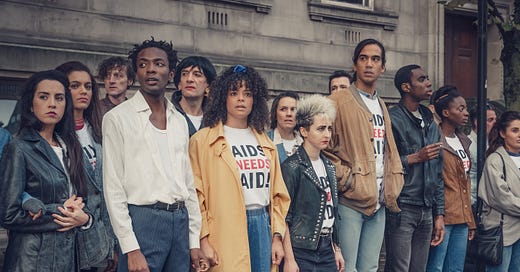Russell T. Davies latest TV project, It’s a Sin, centres on the lives of twenty-somethings in 1980s London amidst the AIDS crisis. The results are moving and punch harder than expected.
Ritchie (Olly Alexander), Roscoe (Omari Douglas) and Colin (Callum Scott Howells) share a flat in London, having come from different places across the UK including Wales and the Isle of Wight. Ritchie studies acting, Roscoe straddles professions from construction to bar work to other odd jobs, and Colin works for a high-end tailor. Jill (Lydia West), Ritchie’s best friend from acting school, joins the trio and is a constant presence in both the flat and in Ritchie’s career endeavours. Beginning in 1981, the men, particularly Ritchie and Roscoe, enjoy a hedonistic lifestyle of sexual liberation as the whisperings of a disease killing gay men starts to spread.
Davies focused on the ‘here and now’ of gay culture in Queer as Folk (1999). He took a prescient look to the future in Years and Years (2019). It’s a Sin harks back to the past, spanning 1981-1991 over its five episodes, and Davies and director Peter Hoar find an artful balance between highlighting the damage caused by AIDS and the showcasing the joyful lives these men led.
It’s a Sin is far from the first series to look at this era. Angels in America (2003), And the Band Played On (1993), The Normal Heart (2014) and Holding the Man (2015) have demonstrated the devastation caused during the AIDS crisis to high artistic effect. It’s a Sin, however, gains an unintended significance airing during the coronavirus pandemic.
Scenes of men locked up in quarantine wards, forced to isolate from all hospital staff are familiar and sting. Like the premiere of Hulu’s The Handmaid’s Tale (2017- ) in the immediacy after the 2016 Trump election, It’s a Sin benefits from its time of release.
Splintered opinions divide and factions emerge within the gay community in the series, a feeling all too familiar to the 2021 viewer. Ritchie theorises conspiracies of government suppression where Jill seeks more information and facts. Davies’ characters are complex and realistic. Their dialogue is natural and though the denial is difficult to watch, it is contextual and relatable.
1980s London looks vibrant and sounds great, particularly in the first episode. Power ballads and pop bangers (think Blondie, Kate Bush, Belinda Carlisle and Joy Division) add levity alongside a poignant score by Murray Gold, only missing the mark once with a cringey triumphant protest moment.
Lydia West holds the series together as Jill. Following a strong performance in Years and Years, West embodies a compelling mixture of calm and exuberance, tapping into Jill’s healing nature. Omari Douglas and Callum Scott Howells give impactful performances that highlight the terror gay men felt. Olly Alexander, who strangely receives solo top billing (and also coincidentally fronts the band Years and Years), plays Ritchie’s indulgent cockiness and charm with ease but struggles in heavier scenes, even exhibiting crocodile tears in a breakdown scene in the fourth episode. Supporting performances from Stephen Fry, Neil Patrick Harris and Keeley Dawes add weight to the ensemble, with Dawes turning in a surprising and stirring performance in the final episode.
It’s a Sin is an important addition to the many documented stories of gay culture during the time of AIDS. Davies details the damage fear and misinformation cause alongside the insidious disease itself. Audiences, particularly younger queer audiences, need reminding of the time where a disease initially did distinguish its victims and It’s a Sin captures these tragic stories with confidence, heart and style.
It’s a Sin is streaming on Stan.
Whole series screened for review.
Never miss an update
Subscribe to 52 Seasons now and you won’t have to worry about missing anything.
Every new post will go directly into your inbox and you can easily unsubscribe at any time (I promise I won’t mind).





